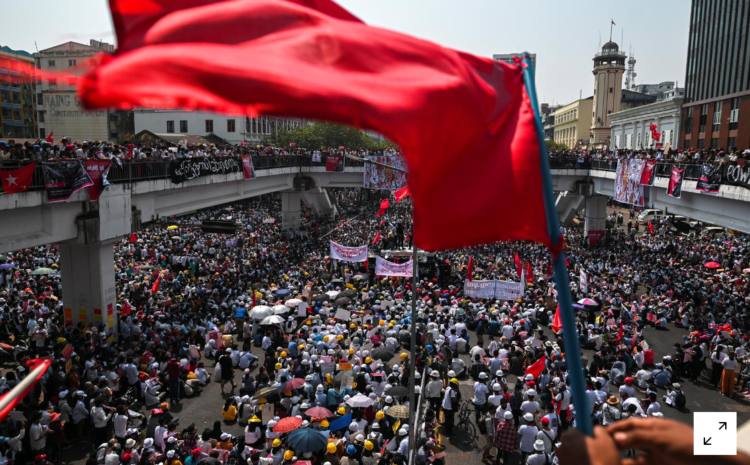Hundreds of thousands gathered in cities and towns across the country, from the northern hills on the border with China to the central plains, the Irrawaddy river delta and the southern tip of the panhandle, social media images showed.
For protester Kyaw Kyaw in the main city of Yangon, losing pay to join the strike was a small price to pay.
“Nothing’s going to happen if my salary is cut but if we stay under a military dictatorship we’ll be slaves,” he said.
In the capital, Naypyitaw, where the military is headquartered, a police water cannon truck and a fleet of other vehicles closed in to break up a procession of chanting protesters who scattered when police on foot rushed in, wrestling several to the ground.
The response of security forces this month has been less deadly than in earlier bouts of turmoil in almost half a century of direct military rule but three protesters have been killed – two shot dead in Mandalay on Saturday, and a woman who died on Friday after being shot more than a week earlier in Naypyitaw.
The army has said one policeman died of injuries sustained during the protests. It has accused protesters of provoking violence.
Late on Sunday, state-owned media MRTV warned that confrontation could cost lives.
“Protesters are now inciting the people, especially emotional teenagers and youths, to a confrontation path where they will suffer loss of life,” the broadcaster said.
Facebook said on Monday it had removed MRTV’s pages for violations of its standards, including its violence and incitement policy. On Sunday, it deleted the military’s main page for the same reason.
Military-run Myawaddy News reported that junta chief General Min Aung Hlaing had said the military was following a democratic path and, referring to rubber bullets, that it wanted to use minimal force.
“Nothing is more important than human life. That’s why military is controlling the situation carefully,” the broadcaster quoted him as saying.
Talk of a general strike was a rumour and markets and shops were open, it said.
As well as local stores, international chains announced closures on Monday, including Yum Brands Inc.’s KFC and delivery service Food Panda, owned by Delivery Hero. Southeast Asian company Grab stopped delivery services too, but left its taxis running.
‘WE’RE GOING’
In a country where dates are seen as auspicious, protesters noted the significance of the date 22.2.2021, comparing it with demonstrations on Aug. 8, 1988, when a previous generation staged anti-military protests that were bloodily suppressed.
But that and the government warning did not put people off.
“We need to come out,” said San San Maw, 46, at a main rallying point in Yangon.
Later, riot police lined up, apparently preparing to disperse protesters from outside a U.N. office, but the crowd broke up after singing a festive song that features the line: “Goodbye, we’re going”.
Crowds elsewhere in Yangon melted away by late afternoon.
Several Western countries have condemned the coup and decried violence against protesters.
U.S. Secretary of State Antony Blinken said on Twitter the United States would continue to “take firm action” against authorities cracking down on opponents of the coup.
Britain, Germany and Japan have condemned the violence and U.N. Secretary-General Antonio Guterres urged the military to stop repression.
Myanmar has denounced interference in its affairs.
The army seized power after alleging fraud in Nov. 8 elections in which Suu Kyi’s party trounced a pro-military party, detaining her and much of the party leadership. The electoral commission dismissed the fraud complaints.
A rights group said that as of late Sunday, 640 people had been arrested in connection with the coup.
Reporting by Reuters staff; Writing by Matthew Tostevin, Robert Birsel; Editing by Stephen Coates, Simon Cameron-Moore and Timothy Heritage
Our Standards: The Thomson Reuters Trust Principles

